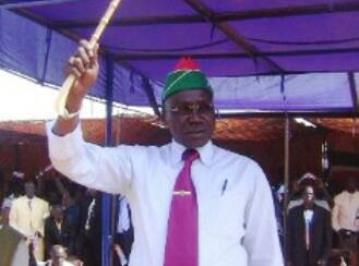South Sudan’s new army commander says constitutional defence top priority
April 26, 2014 (JUBA) – South Sudan’s new army (SPLA) commander has said his priority will be to protect the constitution and the territorial integrity of the new nation, in an apparent back-track on previous statements in which he called for the withdrawal of soldiers from the Bahr el Ghazal region fighting rebel forces in different areas across the country.

“The mission of an army is always to ensure defence of the nation, the lives of the people from any harmful threats and their properties. Another important mission of the army is to protect the constitution of the country and restore law and order. This is what we must do now as the top priority,” he said.
While Awan acknowledged existing challenges facing the army, he said he was committed to working with the country’s leadership to ensure that the basic needs of military personnel are met.
He also urged the army to remain prepared and on alert in the face of impending conflict with the rebel fighters in the country.
“I have always said that a soldier should always give priority to combat preparations. The minds of the commanding officers and soldiers alike seem to be away from the battlefield. This current attitude and behaviours must change,” he said.
However, critics have questioned the reasons behind Awan’s sudden change of heart, after previously advocating for the withdrawal of government troops from Aweil, the capital of his home state of Northern Bahr el Ghazal (NBeG).
Awan, a military veteran and the current governor of NBeG, was appointed after his predecessor General James Hoth Mai was sacked by president Salva Kiir.
Observers say Awan and his supporters pressured the president to remove the SPLA’s former chief of general staff amid concerns Mai was working against the leadership and collaborating with government critics.
Awan had also threatened to recall government troops from the Northern Bah el Ghaal region currently fighting rebels loyal to former vice-president Riek Machar in Jonglei, Upper Nile and Unity states.
“I have always said this president has reached a point where he only reacts to threats about him. He lacks strategies because he is not proactive. He has now appointed Malong because he had threatened to expose him,” a critic of Awan told Sudan Tribune on Saturday.
“He (Awan) said he would encourage the recall of all those in Jonglei, Upper Nile and Unity, saying he would see how they (his critics in the government) would fight the rebels without him,” he added.
Another critic, who also spoke on condition of anonymity, said the president realised his popularity was waning and thus wanted to surround himself with his most trusted advisers and allies.
“The president removed General James Hoth Mai because he was [an] objective officer. He does not want to be used in the conflict, which allies of the president like Paul Malong did not like. Those [supporters] of Malong were seeing James Hoth as collaborating with politicians working to bring the president down,” he said.
The critic said Kiir’s decision to appoint both the head of military intelligence and army chief of staff not only from within his home region but also from his own ethnic group suggested the president’s power base was slipping.
“The recent appointments in the army have shown that the president has accepted to be a regional leader. He is no longer the head of the state, otherwise what prevented him from appointing the new chief of general staff from [an]other region or tribe? the critic said in an interview with Sudan Tribune on Saturday.
He said the president’s decision to replace moderate and liberal army generals with hardliners from the region would add more pressure on his government and possibly defeat from the presidency.
“The president thinks the removal of moderate and liberal army officers from their positions would spare him from this crisis. No. These changes will add more pressure,” he said.
Anthony Sebit, a Juba-based analyst, said the president was removing military figures whose loyalty had been called into question by his supporters and replacing them with loyalists in order to allow him to assert complete authority by aligning those who he thinks will help boost his leadership into the future.
“My reading from these recent changes is that the president had reached a point where his close aides and allies were getting frustrated. We hear some of them had threatened to recall their relatives and friends serving in the army. These were already signs of frustrations,” said Sebit.
“So for him (the president) to appease them (his allies) is to act in their favour. After all, the government in the African context is all about friends and people you trust,” he added.
(ST)
